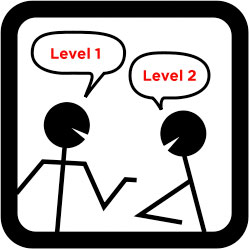
I immediately jumped on a support chat with HostGator (the company which hosts this server). It took me about 20 minutes to get on a chat as since HostGator has been sold they can’t seem to hire enough technicians, and it can take a while to reach someone. I finally did, and the gentleman who was running the chat was extremely friendly and as helpful as he could be. But the problem is he is the first level support person. They are great for helping you with things like email and other simple settings and issues. But in all honesty, any halfway complicated issue is beyond their knowledge and/or capabilities. Typically they will open a ticket for you or tell you to request a reboot or things like that. So then you have to wait for the next level of support to actually look at the issue and handle it.
So what I am proposing is that web hosting companies have two levels of support chats, one to handle the minor issues and then have another for the more difficult problems. And so you don’t lose a bunch of time when you have a server down or other serious issues, the first level person should pass it along to the next level on the chat, instantly. That person can actually jump in reboot, look into more serious issues, hacking etc.
This would save so much angst for web hosting clients. As with many web development firms, I have several hosting accounts, but I still have to rely on hosting vendors to manage the day to day tasks. They are the experts in the field, and they are the ones we turn to. But in today’s world we have so many more issues affecting us, and the threat of hacking is real and it’s never a question of if you’ll be hacked, it’s a question of when. So we really need help from hosting vendors.
Bottom Line: Having a two level support chat will definitely help. But we also need better handling of major outages. We have seen a few of these in the last few months, lasting as long as 9 hours or more. We are bombarded with calls, and text messages, but can’t get through to webhosting companies as they can’t handle the volume. There has to be a better way. For one thing when a server is down, there should be an immediate email blast detailing the situation so that we can pass the information along to our clients. In that email needs to be an estimate as to when the issue will be resolved as that is what our clients need to know.
Sadly, in the world we live in, websites are always under threat of attack from hackers and people with negative intent. A good example of this happened the other day. The company which houses my dedicated server was down for almost 24 hours. They claimed it was due to a firmware update in their main data center. Now whether that’s true, or they were hacked and they just can’t tell you for security reasons, the result was the same. My site was down as were many of my customers who are on that particular server. Unfortunately with hundreds of thousands of sites affected, it is very hard to get in touch with hosting companies. Live chat went down as they couldn’t handle the volume, and forget about phones as you sat on hold for hours.

The problem is that since emergencies don’t happen all the time (Thankfully), people don’t always know where to turn. For me this is a question of educating my clients. In my next email to my client list, I will be instructing people what to do in the event their website is down and/or email. Unfortunately one of the first thing that happens is people want to go in and change email settings. I always instruct people to first make sure their websites are up and running before mucking around with your email. Typically your email settings don’t change very often. So they should leave them alone unless they speak with me.
Managing websites is about communication. In this day and age you need to have alternate forms of communication as well. Social media is perfect as most people are on either Facebook or Twitter and both have an excellent up time records.